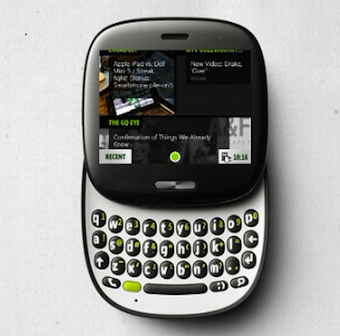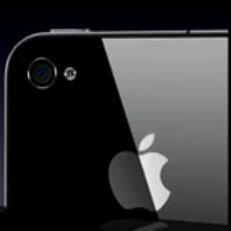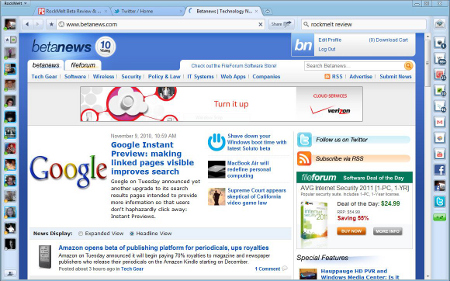
Do more Betanews readers use Linux PCs than Macs?
It's the unexpected question I'm asking you following Friday's PC user poll, which is embedded below to take additional responses. The poll is about identification, rather than usage. Instead of asking what operating system you run, I ask how you identify yourself as a PC user. Not surprisingly, 76 percent of respondents identify themselves as Windows PC users. But surprisngly -- well, to me -- nearly 12 percent identify themselves as Linux users, which is slightly more than Macintosh. Could this possibly be true?
While the poll is embedded at Betanews, it is accessible by anyone. I expect that most respondents are Betanews readers, but they don't have to be. This post may marshall the fanboys and skew further results, which as I post are 682 votes, with 507 for Windows PC, 77 for Linux PC, 70 for Macintosh and 19 for other. Please vote if you haven't. The poll requires JavaScript. If you have disabled JavaScript or you can't see the embedded poll, please use this link.

Microsoft's Kin gets second chance on Verizon as a "feature phone"
About five months after Microsoft decided to kill off its Kin phone project, leaked documents obtained by mobile blog PPC Geeks indicates that the company plans to bring back the devices as feature phones, but without the functions that set it apart.
Tech blog Engadget says sources have told it that the Kin's most data-intensive features have been disabled. This would mean its "Loop" feature -- possibly one of the most unique qualities of the device -- would no longer work. However, Zune Pass would still operate over Wi-Fi as long as the customer carries the appropriate data plan.

'This film is rated PC: No Macs were used in the making of this video'
Yesterday, Microsoft posted video "PC & Mac take flight -- Avatar & Windows 7." It's not the most clever title, but the story is subtle and driving, like good marketing should be. Microsoft mad men once again cleverly market Windows 7 PC benefits, but, more importantly, they quite effectively highlight the differences between a Windows PC and Mac.
The video features a Windows laptop and Mac notebook in adjacent seats on a plane flight. The animated short is long on subtle marketing cues -- like the airplane made out of Campbell soup-like "Windows Seven" cans; plane taking off over a Hollywood-like "Microsoft" sign; Windows logo on fasten-seat-belt-sign; and rating: "This film is rated PC. No Macs were used in the making of this video."

Sprint and Clearwire at odds over 4G-capable devices that only use 3G
WiMAX network operator Clearwire is in arbitration talks with its majority shareholder Sprint, an SEC filing from Clearwire revealed today. The two companies are in dispute over dual-mode WiMAX phones such as the HTC EVO 4G and the Samsung Epic and the wholesale charges they incur.
"We have been engaged in ongoing negotiations with Sprint to resolve issues related to wholesale pricing for Sprint 4G smartphone usage under our commercial agreements with Sprint." The filing says. "On October 29, 2010, we received a notice from Sprint initiating an arbitration process to resolve these issues. The process is in the early stages, and its outcome is unknown."

Google adds its own Calendar, Docs, YouTube extensions to Chrome
When Google officially integrates its own Web services into Android and Chrome, the products usually work well and are always worth at least a look by users of those platforms. Yesterday, Google announced new official Chrome extensions for Calendar, Google Docs, and YouTube which offer new, but somewhat limited, first-party features to Chrome.
The Google Calendar extension lets users click add events to their Google Calendars from their Chrome toolbar. This extension works in a couple of ways: users can add events from scratch, or they can import event information presented in the hCalendar microformat or some of its derivitaves like hResume. So if an event on Facebook or Evite is compatible with the extension, a green plus sign will appear that users can click and automatically import the event data in their calendar.

Amazon defends, then pulls listing of book for pedophiles
Amazon became the target of Internet criticism after initially ignoring pleas to remove a book it listed in its Kindle store on the subject of pedophilia, only to quietly change position and remove the book on Thursday without much notice.
The book, "The Pedophile's Guide to Love and Pleasure: a Child-lover's Code of Conduct" by Phillip Graves, was sold by Amazon for $4.79. It was intended to give those interested in such activity advice on the subject. However, child protection advocates saw the book as potentially dangerous, and threatened to boycott the online retailer.

Firefox 4 Beta 7: Faster than 3.6, but not 5x faster
Yesterday, after several weeks of delay due to continued heavy crash counts, Mozilla released public beta 7 of its Firefox 4 browser, with at least three more public beta cycles planned before the end of the year. Beta 7 is the first public release to contain the device Mozilla calls JaegerMonkey, which hybridizes the optimized TraceMonkey engine introduced in Firefox 3.5 with a new just-in-time native code compiler.
The organization touted Beta 7 as being three to five times faster than the stable Firefox 3.6.12 in executing well-known benchmark suites, including the organization's new Kraken suite, and Google's V8 test battery. In a newly revised series of tests conducted this morning by Ingenus LLC, there were limited instances of 300% acceleration, but not across the board. Firefox 4 Beta 7 posted speed scores that were 2.38 times those of Firefox 3.6.12 overall.

Social networking will displace corporate e-mail
[Editor's Note: The survey below requires JavaScript. If you have disabled JavaScript or can't see the embedded survey, please use this link. You can choose up to two answers.]
In January, I posted "Microsoft Office is obsolete, or soon will be," which generated heated comment debate and accusations of linkbaiting. Never. I'm always serious about this stuff, and I tend to be right. Today, Gartner added a little oomph to my assertion, claiming that within four years, 20 percent of business users will replace e-mail with social networking services. Really? I think Gartner is being a wee bit conservative.

iTunes Store links up with Twitter via Ping
Ping, the social music service introduced as a part of iTunes 10 in September, can now be linked with Twitter, the popular microblogging service announced Thursday.
Starting today, Ping users can connect their iTunes Ping account to their Twitter account and share their listening activity in their Twitter feed. Tweets sent from Ping include the album and artist information, album cover, song preview, and a link to the iTunes store to buy the music mentioned.

Mozilla releases beta 7 of Firefox 4, claims 3-5x performance boost
Mozilla Wednesday released a significant update to the beta of its Firefox 4 browser. The update adds a new JavaScript JIT compiler, going by the name of JägerMonkey, and improves the browser's support for hardware acceleration, OpenType fonts, and WebGL 3D graphics (the technology used to create an HTML5 version of Quake II back in April.)
Additionally, the latest beta includes a stable add-ons API, so developers can finally update their add-ons to Firefox 4.

RIM plans to make its tablet competitive with sub $500 price point
RIM's PlayBook will be introduced in the spring of next year and at a price point below $500, its co-CEO Jim Balsillie confirmed to several news outlets on Wednesday. It seems clear RIM intends to compete with Apple's iPad in one of tech's fastest growing sectors by pricing it close to the now top-selling tablet.
RIM's tablet plans surfaced in the first part of this year, when Betanews was able to confirm details on the device at that time through company sources. RIM itself unveiled the device in September, naming it the PlayBook.

Branded 'dumbphones' are being squeezed out, research shows
For years, Industry researchers have been saying that the drop in price for pocketable technology will cause more people to switch from simple "voice and text" phones to sophisticated smartphones. Now, after four years of smartphone sales growth in the neighborhood of 30-50% per annum (source: IDC, Gartner, ABI research) an explosion in smartphone sales is now taking place. However, in emerging markets, it's a different story.
Market analysts at Gartner Inc. today published their worldwide mobile phone sales numbers for the third quarter of 2010; and smartphones, which includes BlackBerry, iPhone, Android, Symbian, and Windows Phone devices, has grown 96% since the third quarter of 2009. These results sync very closely with the shipment figures published by IDC last week, which tracked an 89.5% annual growth in the number of smartphone shipped to retailers.

Sprint to offer '3G iPod Touch' accessory on November 14
Sprint said Wednesday that it would begin offering an iPod touch case that would allow users to connect to the carrier's 3G network on November 14. Manufactured by ZTE, the "Peel" would include built in Wi-Fi, which would allow not only the iPod touch to connect but also another wireless device.
The Peel will retail for $79.99 and require a $29.99 per month data plan, which is a month-to-month agreement. 1GB of data would be included. The device is the second announced for the iOS platform: in April, the company touted a 4G "case" for the iPad.

RockMelt "social" browser: Not very special
For the last 72 hours, reviews of a new browser called RockMelt have been turning up all over my feeds, and now that the initial hype of the limited beta is dying down, I thought I'd unlock my tongue and talk about it.
Betanews readers have proven time and again to be die-hard browser connoisseurs, and after spending a day playing with the beta of Chromium-based RockMelt, I almost didn't want to write about it. The entire browser, from its concept to its code, is pretty contrived.

Amazon opens beta of publishing platform for periodicals, ups royalties
Amazon on Tuesday announced it will begin paying 70% royalties to magazine and newspaper publishers who release their periodicals on the Amazon Kindle starting in December. The move follows a similar royalty increase Amazon made in June, when the company began offering a 70% option for books published through its Digital Text Platform (DTP.)
Coincidentally, the company today launched the Beta of the Kindle Publishing for Periodicals tool, which is similar to DTP, but lets publishers add content and preview Kindle formatting prior to making their titles available on the E-reader.



